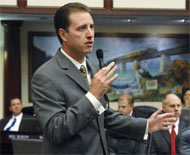4/5/2010
Florida Representative Fights Back Against Red Light CamerasLegislation that would ban the use of red light cameras in Florida faces a bill that retroactively authorizes automated ticketing.

A Florida state representative is standing athwart the legislative juggernaut that seeks to expand the use of red light cameras throughout the state. Representative Rob Schenck (R-Spring Hill) last month won approval by a 7 to 5 vote from the House Governmental Affairs Policy Committee for his bill expressly preempting the ability of local jurisdictions to operate automated ticketing machines.
"Current law requires that traffic citations be issued when an officer observes the commission of a traffic infraction," the official legislative analysis for House Bill 1235 explained. "A 2005 attorney general opinion also reached the same concluding providing that legislative changes are necessary before local governments may issue traffic citations and penalize drivers who fail to obey red light indications on traffic signal devices as collected from a photographic record from unmanned cameras monitoring intersections... This bill could have a negative fiscal impact on those governments having installed red light cameras and on those local governments using such cameras to generate revenue through the collection of civil fees or fines."
Since 2008, about fifty city and county governments have ignored the attorney general's warning and enacted ordinances authorizing tickets of up to $500 mailed by a private company to the owner of a vehicle photographed by the automated camera. These jurisdictions claim that photo enforcement is necessary to combat a growing problem on the state's roads, despite evidence that the number of such accidents had been decreasing without cameras.
"Injuries from disregarding traffic signals have steadily decreased since 1998, as have property damage-only crashes which were less than 3 percent in 2008," the legislative analyst explained.
The legislative analyst also pointed out that red light cameras have not proved as effective as their advocates have suggested.
"Numerous studies have been conducted regarding the impact of red light cameras on safety and the findings have been inconsistent," the legislative analyst explained. "Evaluations of red light cameras have been conducted in Virginia, Greensboro, North Carolina and Ontario, Canada. These evaluations were conducted over multiple years and data was gathered from intersections with and without red light cameras during the same time periods. The data showed that the intersections with cameras were associated with a significant increase in crashes.... The studies also documented that intersections with cameras were associated with increased injury crashes or crashes with possible injuries."
Schenck's bill faces an uphill battle as it moves toward a vote in the full House. Local jurisdictions have joined with the insurance industry -- license points are assessed on red light camera tickets in states like Arizona and California, allowing these companies to increase rates -- in pouring money into an all-out lobbying campaign to legitimize camera use. A bill to do so narrowly failed last year as special interests fought over how ticketing profits should be split. State Representative Ron Reagan (R-Bradenton) re-introduced his measure to "bring consistency" to the way cameras are used. Its primary purpose, however, is to insulate cities from lawsuits by retroactively approving ordinances that were adopted contrary to the attorney general's warning. Reagan's industry-backed measure was approved last month by the Health Care Regulation Policy Committee.
View House Bill 1235 in an 80k PDF file at the source link below.


